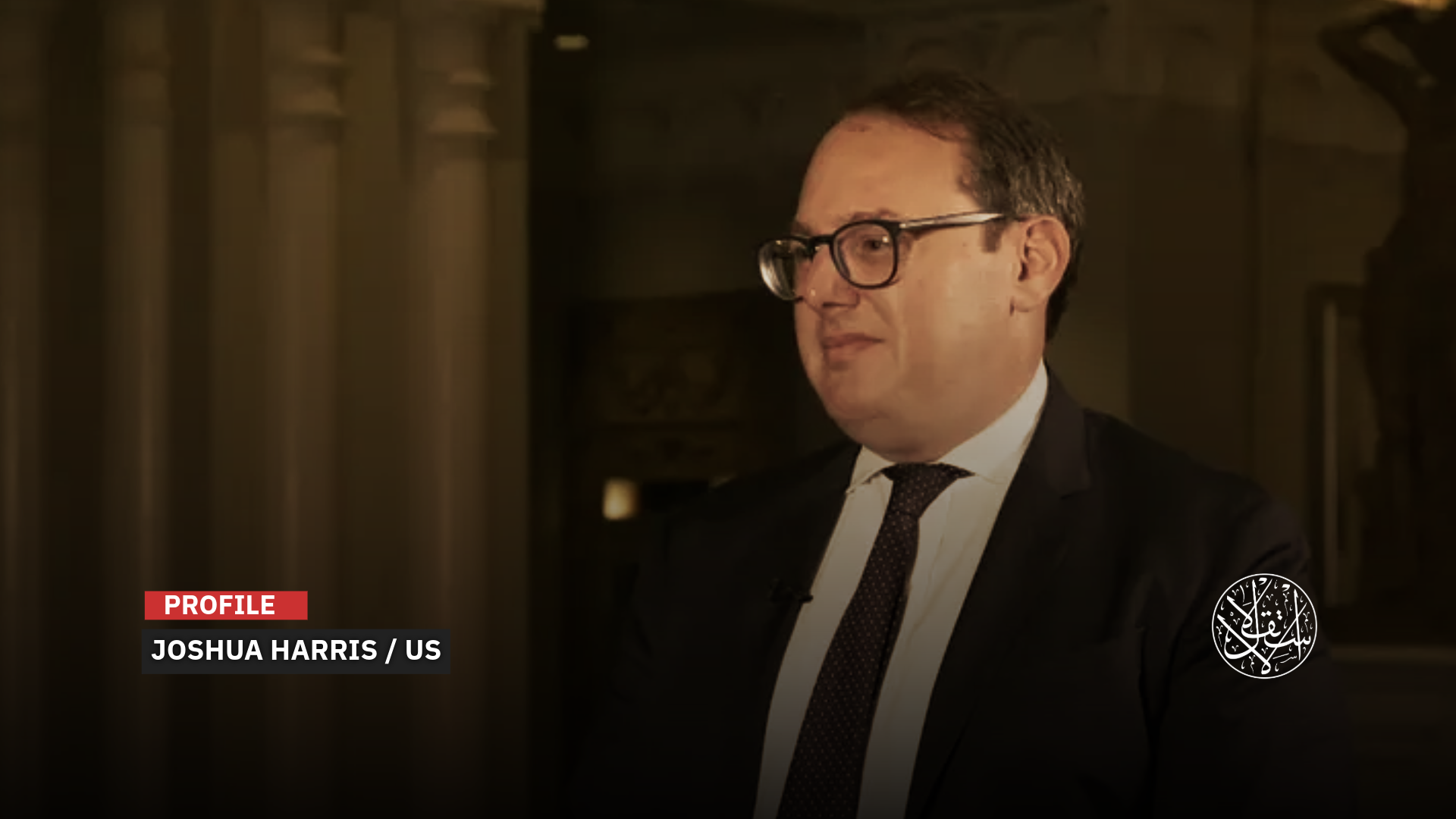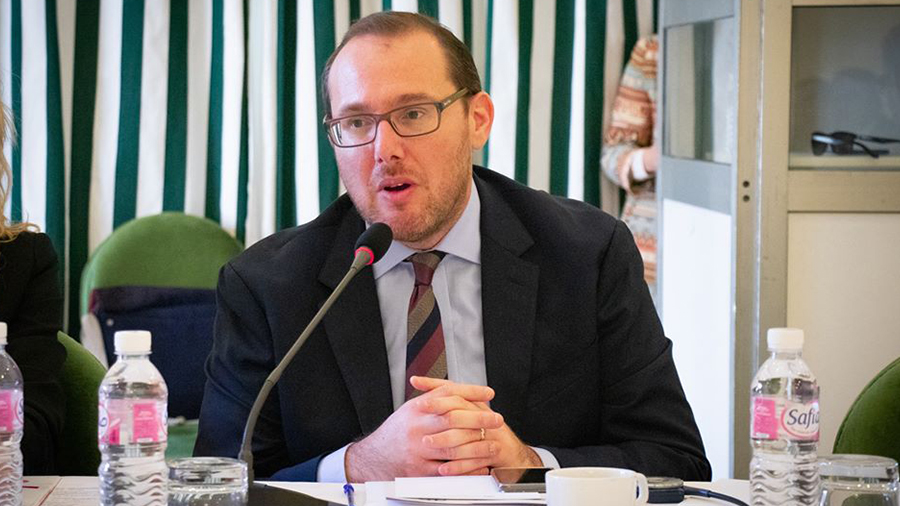Joshua Harris: U.S. Diplomat Overseeing Iraq Withdrawal at a Critical Moment

Harris arrived unexpectedly to lead the U.S. Embassy in Baghdad during a sensitive period.
The U.S. Department of State has appointed Joshua Harris as its new chargé d’affaires in Baghdad at a sensitive time, as Washington begins withdrawing troops from Iraq while pressing the Iraqi government to dismantle the Popular Mobilization Forces and curb Iran’s influence.
Harris succeeds Steven Fagin, who spent three eventful months delivering messages and warnings to political leaders over U.S. opposition to the Popular Mobilization Forces law in parliament.
The proposed law seeks to make the Popular Mobilization Forces part of Iraq’s regular armed forces under the direct authority of the commander in chief, a move Washington opposes because it would “cement Iranian influence and empower armed groups, undermining Iraq’s sovereignty.”
Fagin had assumed his post at the U.S. Embassy in Baghdad on May 28, following several months of vacancy and delays in appointing a new U.S. ambassador to replace Elena Romanowski, the previous ambassador, who left her position at the end of 2024.

Diplomat with Decades of Experience
Joshua Harris’s appointment follows three years as deputy assistant secretary of state in the Bureau of Near Eastern Affairs.
Harris, believed to be in his fifties, has kept his personal life private, with public information limited to his academic background.
According to the U.S. Department of State, he is a graduate of Georgetown University’s Edmund A. Walsh School of Foreign Service and also studied at the London School of Economics and Political Science. He speaks Arabic, Croatian, French, Italian, and Polish.
He previously served as policy director for the U.S. special presidential envoy to the Global Coalition to Defeat ISIS and as director for Iraq affairs on the National Security Council. He is a seasoned senior diplomat.
The State Department notes that Harris has been responsible for files covering several countries, including Algeria, Egypt, Libya, Morocco, and Tunisia.
Between 2021 and 2022, he served as director for North Africa affairs at the National Security Council, coordinating the development and implementation of U.S. policy toward the Maghreb region.
From 2019 to 2021, he was repeatedly deputy chief of mission and acting chargé d’affaires at the U.S. Embassy in Tripoli, as well as at the U.S. Libya External Office in Tunis.
Earlier, he held the position of acting deputy assistant secretary of state and director of the Office of Maghreb Affairs in the Bureau of Near Eastern Affairs. His portfolio also included Slovenia, Iraq, Libya, and Croatia.

Previous Positions
Several statements have highlighted Harris’s views on a range of issues during his tenure as deputy assistant secretary of state under former President Joe Biden, particularly regarding Israeli Occupation’s ongoing aggression on Gaza since October 7, 2023.
In an interview with Algeria Maintenant on December 9, 2023, Harris said the United States rejects violence against civilians anywhere by anyone and reiterated his support for a final resolution through a two-state solution.
He stressed at the time the need to address the humanitarian situation in Gaza and ensure the delivery of food, medicine, water, and fuel to Palestinians suffering severely.
Regarding attacks by Yemen’s Houthi group on ships supporting “Israel,” Harris said some actors in the region are trying to exploit the current situation to spark a broader regional conflict, including Iran’s actions through proxy groups across the region.
He noted that U.S. measures against the Houthis were “highly calculated,” adding that they are not seeking escalation, but they will “defend themselves.”
On the longstanding dispute over Western Sahara between Morocco and the Algeria-backed Polisario Front, Harris stated that, from the U.S. perspective, a lasting political solution involves empowering the Sahrawi people to determine their own future.
Current policy under President Donald Trump indicates a shift on some of these positions, with Washington abandoning the two-state option and supporting a plan that would displace Palestinians from Gaza.
Harris’s statements also contrast with Trump’s stance on Western Sahara. On December 10, 2020, during his first term, Trump recognized Moroccan sovereignty over the disputed territory.
In early August 2025, Trump reaffirmed his support for Morocco’s sovereignty over Western Sahara, stressing that the autonomy initiative proposed by the kingdom represents the only realistic and serious solution to the conflict.

Enemy of Iran
Social media users have highlighted Joshua Harris’s background and the reasons for his appointment to the new post amid the region’s ongoing security and political tensions.
“This is a man who brings investment wherever he goes, and that is very important for Iraq in the coming period,” Iraqi activist Mohammed Kifah posted on X on August 25.
Iraqi journalist Mohammed Mahdi, who has visited the Israeli Occupation several times, claimed that Joshua Harris is of Jewish origin and a Zionist backing Israeli Prime Minister Benjamin Netanyahu in his drive to destroy Tehran and its allies in the Arab world.
In a post on X on August 25, Mahdi added that Harris supported the killing of former Quds Force commander Qassem Soleimani and Iraqi leader Abu Mahdi al-Muhandis, who were assassinated by the United States near Baghdad airport on January 3, 2020.
Mahdi challenged Iran’s allies in Iraq to try to stop the American diplomat from carrying out his mission.
Iraqi writer and politician Suleiman al-Fahd said that “Joshua Harris is preparing to take over the U.S. Embassy in Baghdad from Steven Fagin at a time of regional tension.”
Al-Fahd noted on X that “his previous experience in Iraqi affairs and his skill in navigating diplomacy prepare him to advance Washington’s interests with cunning and malice in Iraqi politics.”
Activist Nagham Jasim quoted U.S.-based Iraqi politician Nizar Haidar as saying that the new U.S. ambassador’s mission is to complete Iraq’s removal from “Iranian control.” She noted that he has intelligence and security experience and was chosen by the White House deliberately for the timing.
“Joshua Harris is considered more of a technical expert on the Iraqi file than a political figure. He is known for his strict approach to security, especially counterterrorism, while trying to balance relations between Baghdad and Erbil, and he takes a hard line on Iranian influence in Iraq,” Iraqi activist and engineer Ammar posted on X.
Several Iraqi media outlets have highlighted Harris’s sudden appointment, coming only a short time after Steven Fagin’s assignment, especially amid a sensitive period of significant challenges in Iraq and the region.
They noted that the timing of the diplomatic change is highly significant, coinciding with the start of the first phase of the international coalition’s troop withdrawal from Iraq on August 22, which will continue until the end of September 2026, aiming for a full withdrawal.
Harris faces major challenges in his new role, including managing the U.S. withdrawal in a way that ensures Iraq’s stability, countering growing Iranian influence, and rebuilding trust with Iraqi political leaders, according to a report published by Middle East Online on August 26.
The report added that Harris will also have to address the long vacancy in the U.S. ambassador’s post in Baghdad, which remained unfilled after the departure of former ambassador Elena Romanowski.
It noted that the appointment of a diplomat of Harris’s stature underscores Washington’s emphasis on its future in Iraq, with responsibilities extending beyond traditional diplomacy to managing a complex network of competing interests.
Sources
- US appoints new chargé d’affaires in Iraq as troop drawdown approaches
- ashington Sends New Chargé d'Affaires to Baghdad at a Critical Moment [Arabic]
- Joshua Harris Nears U.S. Ambassador Post in Algeria: Who Is He?
- Washington’s Envoy Departs as Joshua Harris Takes the Helm at Baghdad Embassy [Arabic]
- Harris Heads to Baghdad Next Week: Arabic-Speaking Official Replaces Fagin [Arabic]
- Joshua Harris
- Exclusive: Full Interview with U.S. Deputy Assistant Secretary Joshua Harris for Algeria Maintenant [Arabic]
- Iraq: U.S. Military Begins Withdrawal from Ain al-Asad Base, Closure Expected in September [Arabic]










